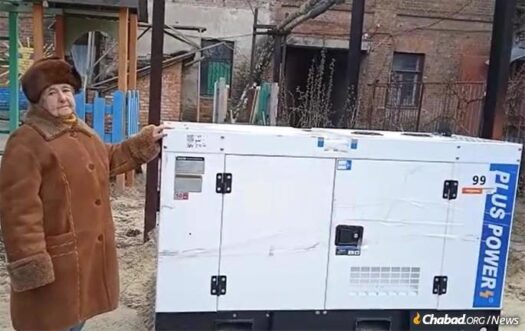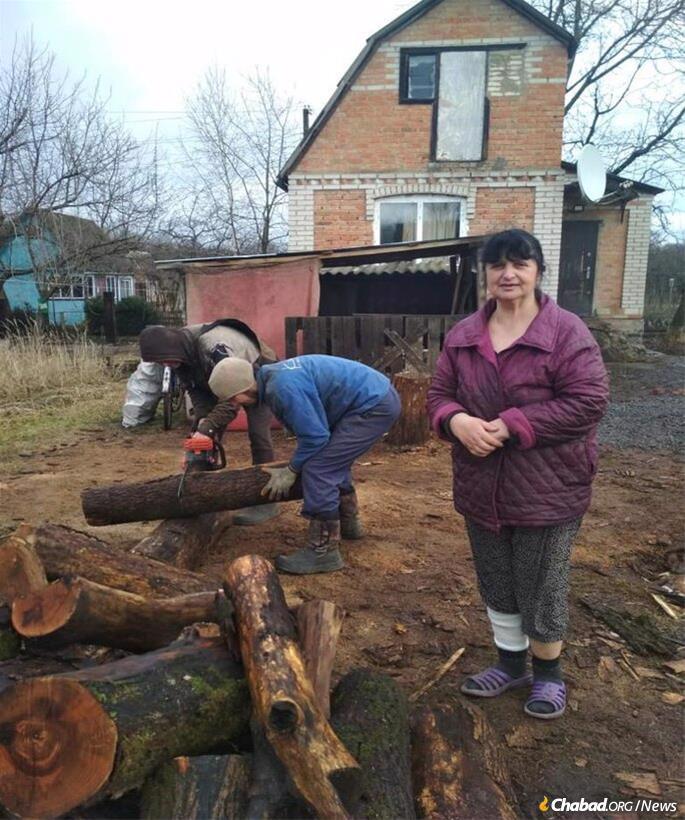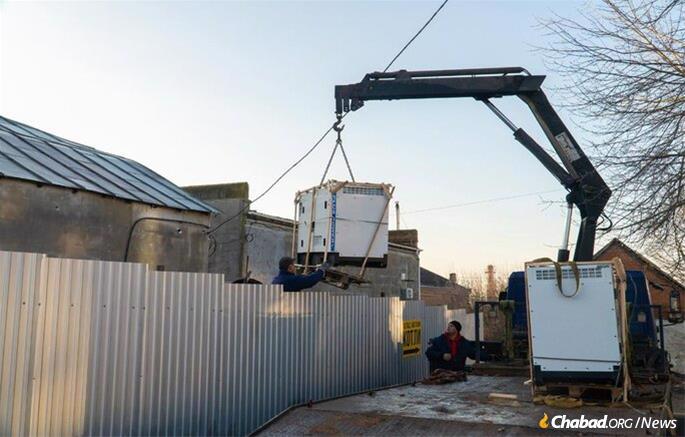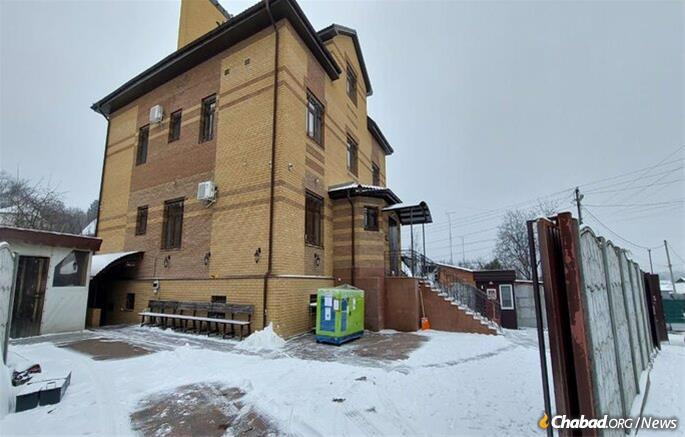
Let There Be Warmth: Chabad Brings Life-Saving Generators to Embattled Ukraine
by Faygie Levy Holt – chabad.org
For millions of Ukrainians this winter, keeping warm is a life-and-death struggle. With the power grid under continuous attack, electricity, heat and hot water are always scarce—and sometimes not available for days at a time—which has made local generators vital for deep-winter survival.
“Now that our community has a generator, the communal kitchen can continue to prepare hot lunches for us,” Svetlana Levovna Suprunova, an elderly resident of Sumy, Ukraine, told Chabad.org, adding that the Jewish communal building, located next door to the synagogue, is her “second home.”
That building—which in better days was home to both a kosher kitchen and a Jewish kindergarten run by Rabbi Yechiel Shlomo Levitansky and his wife, Rochi, directors of Chabad-Lubavitch of Sumy—is now being used as an emergency distribution center. The kitchen is being utilized all day to cook hot meals, and is where people stop for food packages, medicine and warm clothing. At the same time, volunteers pick up prepared packages to deliver to the elderly, reported Levitansky.
This was only possible due to the massive efforts by the network of Chabad-Lubavitch emissaries in Ukraine to get dozens of generators to Jewish communities across the war-torn nation.
“We began planning for winter and the potential need for generators months earlier, while the weather was still warm,” said Judi Garrett, chief operating officer of Chabad-Lubavitch’s Jewish Relief Network Ukraine (JRNU). “When the power outages began in the summer, we recognized that lack of heat would become a matter of life and death during the frigid winter months.”
Chabad surveyed the Jewish communities around the country to understand the need for industrial generators to power Ukraine’s network of Jewish community centers and synagogues, Or Avner Jewish day schools and other focal points of community, all of which also serve as shelters when necessary.

Surveying Every Jewish Communal Building in Ukraine
Rabbi Shlomi Peles, executive director of the JRNU, explained that Chabad rabbis and staff went to every Jewish communal building in Ukraine to see what their specific electrical needs were, as a communal kitchen doesn’t need the same kind of generator as a school or a residence for senior citizens.
With the information in hand, JRNU worked with numerous partners to purchase 150 generators to sustain those in the Jewish community and others as well. Among the partners that Peles praised for working together were the Orthodox Union, which helped to procure the generators from vendors in Europe and Turkey, and Jewish Federations of North America (JFNA), which provided funding for the generators.
JRNU senior advisor Rabbi David Eliezrie, who has worked with Jewish Federations of North America on various projects over the years, said: “We are proud of the partnership we have with JFNA to alleviate the suffering of Jews in Ukraine. This effort is part of the longstanding relationship Chabad has with Jewish federations across the country.”
The Shema Yisroel Network, headed by Rabbi Shlomo Nachman Mandel, was also involved with buying generators for several Jewish sites in Ukraine. Also helping to fund the generator purchases was the International Fellowship of Christians and Jews.
Garrett noted that the orders for the generators went out “before all the money was in hand. With people’s lives on the line, we knew we had to act immediately, and we had faith that the money would come.
“Thankfully,” she continued, “it did.”
A total of 150 generators were ordered and on their way to Ukraine before attacks on the country’s power grid added to the urgency and scarcity. As Garrett said, “it is now virtually impossible to buy any generator to be delivered to Ukraine before April.”

A Multi-Organizational International Effort
According to Julie Platt, board chair of the Jewish Federations of North America, which helped pay for the generators, “we are inspired by the work of our partners at Chabad, and we feel privileged to support their life-saving activities and to extend our arms to our brothers and sisters in distress, in accordance with the Jewish values that guide our work.”
“Raising funds for winter relief so that people living in Ukraine can survive the grave weather conditions.” continued Platt, “is one of the many ways that Jewish communities across the U.S. and Canada have responded and continue to respond to the humanitarian crisis.”
Zevy Wolman, a board member at the Orthodox Union who was helping to spearhead the organization’s work to help the Jews of Ukraine, said “being able to procure the generators was an incredible blessing, and we are so grateful to our partners on the ground who received, distributed, protected and fueled the generators, and are serving their congregations at literal risk to their own lives.”

Recharge Their Phones, Get a Bowl of Hot Soup
Even with generators in place, challenges remain. Fuel costs average $30 per hour, and the average usage of the generators supplied by the JRNU is 68 hours per month. Multiply that by the 150 generators in place, and the monthly fuel bill can exceed $300,000.
As it continues to provide support and goods—from much-needed foodstuffs to toys and soccer balls to help kids relieve the stress of their current situation—JRNU continues to rely on donations from individuals and groups, while a network of more than 190 Chabad emissary couples throughout Ukraine make sure it goes to those in need.
The emissaries have been knocking on doors making sure the elderly are warm, often hiring local electricians or repair people to fix broken windows and lights.
“I was in Odessa a few weeks ago, and I went to a seniors’ home where 40 elderly people live,” said Peles. “G‑d forbid, if they were without a generator, they wouldn’t be at risk of dying from bombs; they would be at real risk of dying from cold.”
Additionally, JRNU and Chabad emissaries have provided thousands of cold-weather packages, batteries and battery-powered lanterns, and even reflective strips for people who need to be out at night when there are no lights to be had overhead.
They’ve also been opening the doors to their community centers and synagogues to the larger community as well.
Said Peles: “Chabad can be proud of its efforts to provide electricity to all the Jewish buildings. It’s not just the Jewish community that is benefiting. When you have a big building lit up and it’s the only place around with electricity, you make sure everyone can come in and recharge their cell phone and have a bowl of hot soup.
“Every day here is another story,” he continued. “We are now hearing from rural communities about their needs, and in some instances, sending containers filled with firewood so people can heat their homes. Some people have already forgotten about Ukraine, but there are people on the ground who need help, and JRNU will do what we can to help them.”
Donations to help the Jews of Ukraine can be made at the JRNU web site here.










